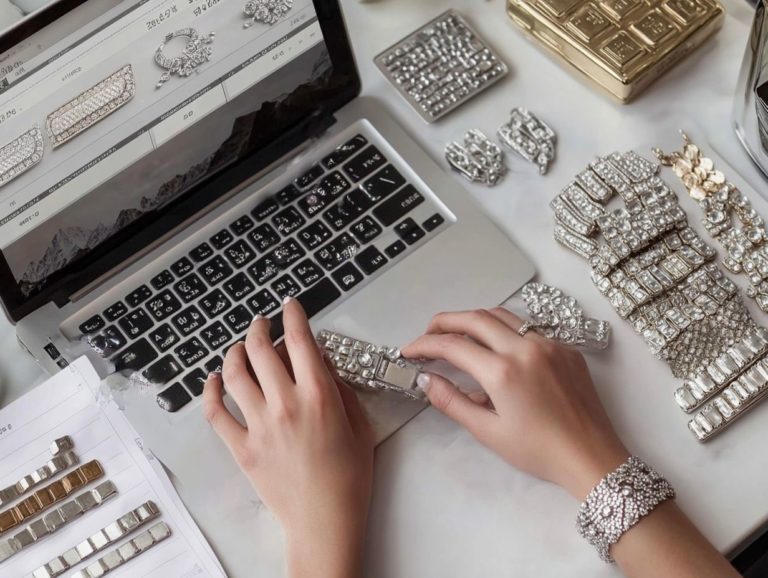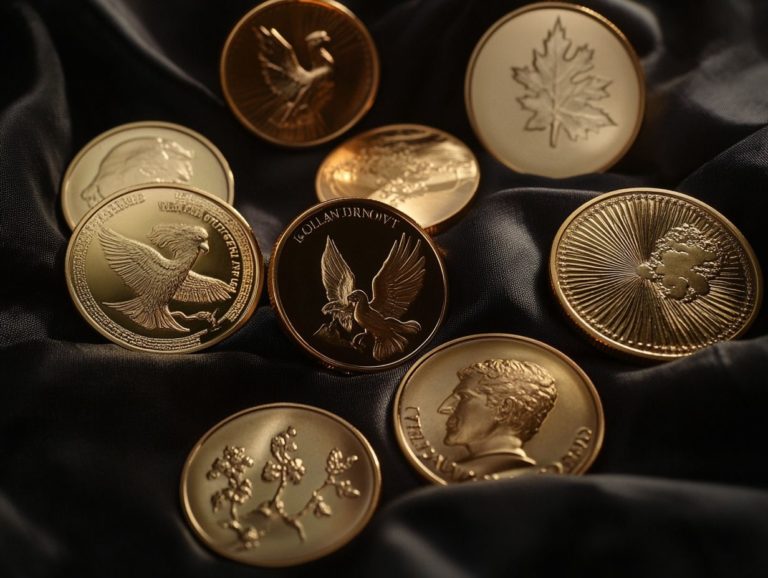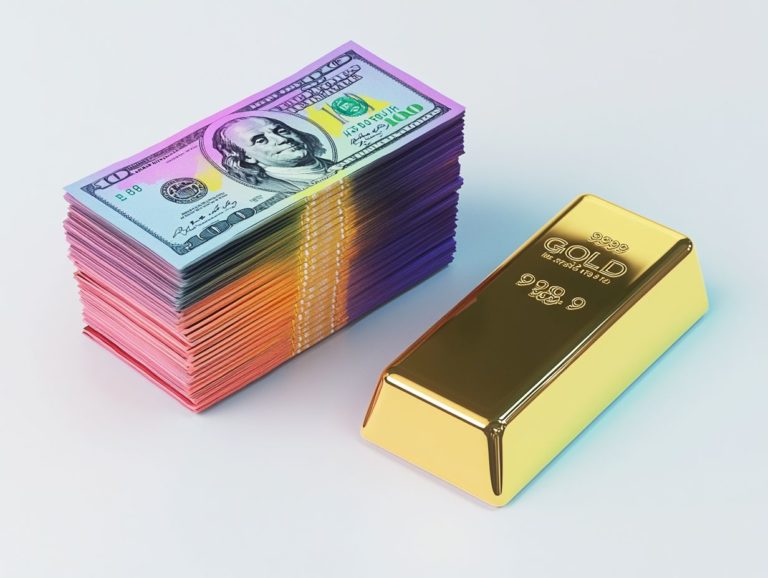What to Do with Inherited Precious Metals?
Inheriting precious metals can be both a remarkable gift and a complex challenge. Whether you ve come into possession of gold, silver, or other valuable items, grasping their worth and determining your next steps is essential.
This article delves into the various types of precious metals, exploring the options available to you whether that means keeping, selling, or donating your inheritance. It also addresses important considerations, such as tax implications and the emotional connections that may influence your decisions.
You will find guidance on selling steps and the benefits of donating. Uncover the most advantageous path for your inherited treasures.
Contents
- Key Takeaways:
- Understanding Inherited Precious Metals
- Options for Handling Inherited Precious Metals
- Factors to Consider Before Making a Decision
- Steps for Selling Inherited Precious Metals
- Donating Inherited Precious Metals
- Frequently Asked Questions
- What to Do with Inherited Precious Metals?
- Can I Sell Inherited Precious Metals?
- What Are Some Alternatives to Selling Inherited Precious Metals?
- Do I Need to Pay Taxes on Inherited Precious Metals?
- Should I Get My Inherited Precious Metals Appraised?
- What Are Some Tips for Storing Inherited Precious Metals?
Key Takeaways:
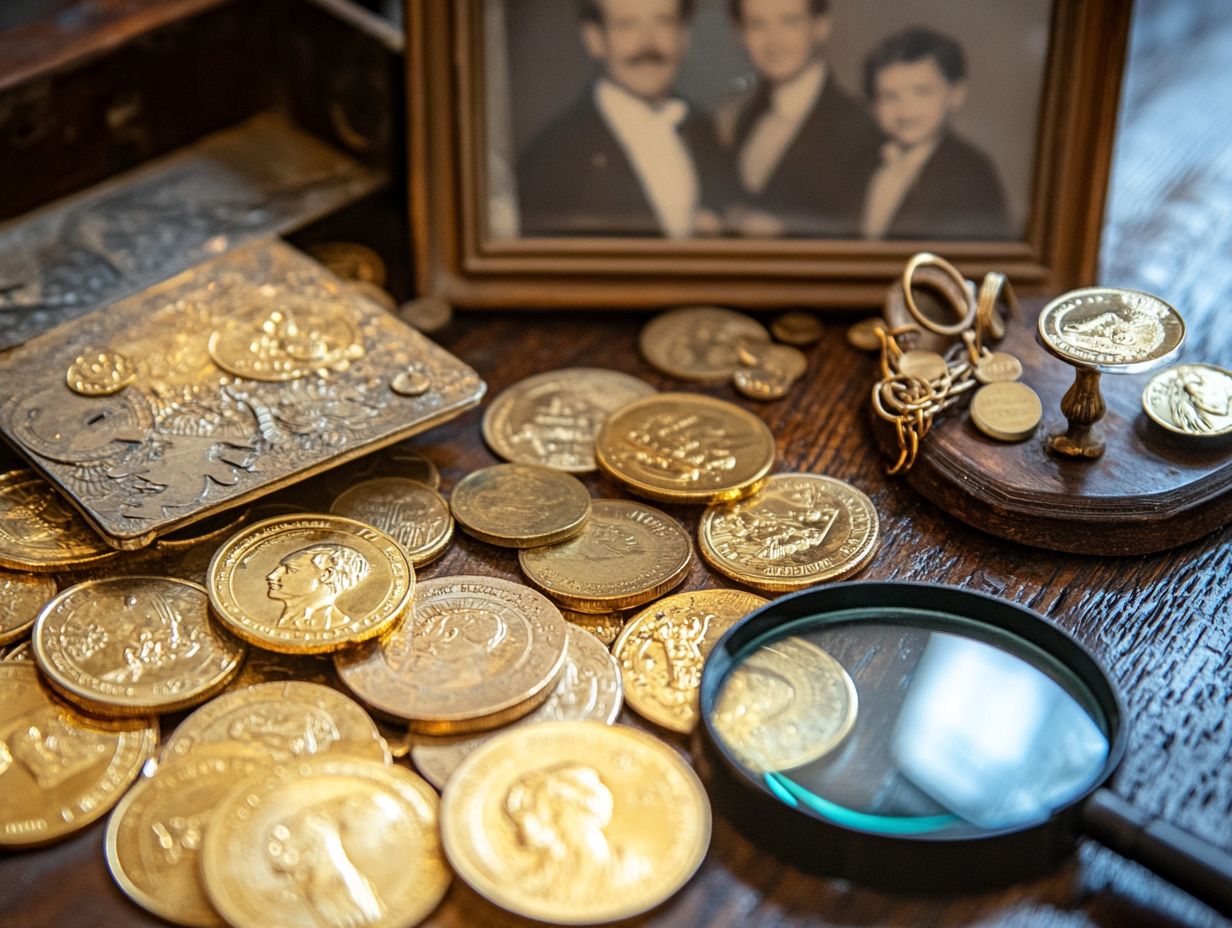
- Understand the types and value of inherited precious metals before making a decision on what to do with them.
- Consider factors such as tax implications and emotional attachment before deciding to keep, sell, or donate inherited precious metals.
- Follow the necessary steps, such as evaluating and finding buyers, when selling inherited precious metals or donating them to charitable organizations for potential tax benefits.
Understanding Inherited Precious Metals
Inherited precious metals, like gold and silver, can carry substantial value and introduce a range of legal and financial complexities in your estate planning. Understanding these aspects is crucial for your journey.
It’s vital to grasp the intricacies of ownership, including appraisals and tax implications, as these factors impact both beneficiaries and the decedent’s estate. Additionally, understanding how to use gold as an investment diversifier can also play a significant role in financial planning.
Whether you’re evaluating market value or considering how an Individual Retirement Account (IRA) might factor into managing these valuable assets, navigating the probate process and estate taxes becomes essential for making informed decisions about tax strategies for precious metals.
Types of Precious Metals and Their Value
The world of precious metals encompasses gold, silver, bullion, and rare coins, each possessing distinct values and unique characteristics that significantly impact their market worth and appraisal processes.
For instance, while bullion’s value largely hinges on its intrinsic metal content, rare coins can fetch considerably higher prices due to their collectible value, which includes historical significance, condition, and rarity. Understanding how to diversify with precious metals can enhance your investment strategy.
Several factors influence market value, such as demand fluctuations, economic conditions, and geopolitical events, each affecting these assets in different ways.
The appraisal process typically assesses a piece’s condition, authenticity, and current market trends, enabling professionals to deliver a fair valuation. Understanding these elements can be crucial as you navigate the dynamic landscape of precious metal investments, especially when considering how to diversify between physical and paper metals.
Options for Handling Inherited Precious Metals
When you find yourself in possession of inherited precious metals, you have an array of options at your disposal. You can choose to sell them, invest in additional pieces, donate to a worthy cause, or develop a tailored investment strategy that harmonizes with your financial objectives and ownership documentation.
Each path offers unique opportunities that can enhance your wealth and fulfill your aspirations, including tax planning for precious metals in a diversified portfolio.
Keeping, Selling, or Donating
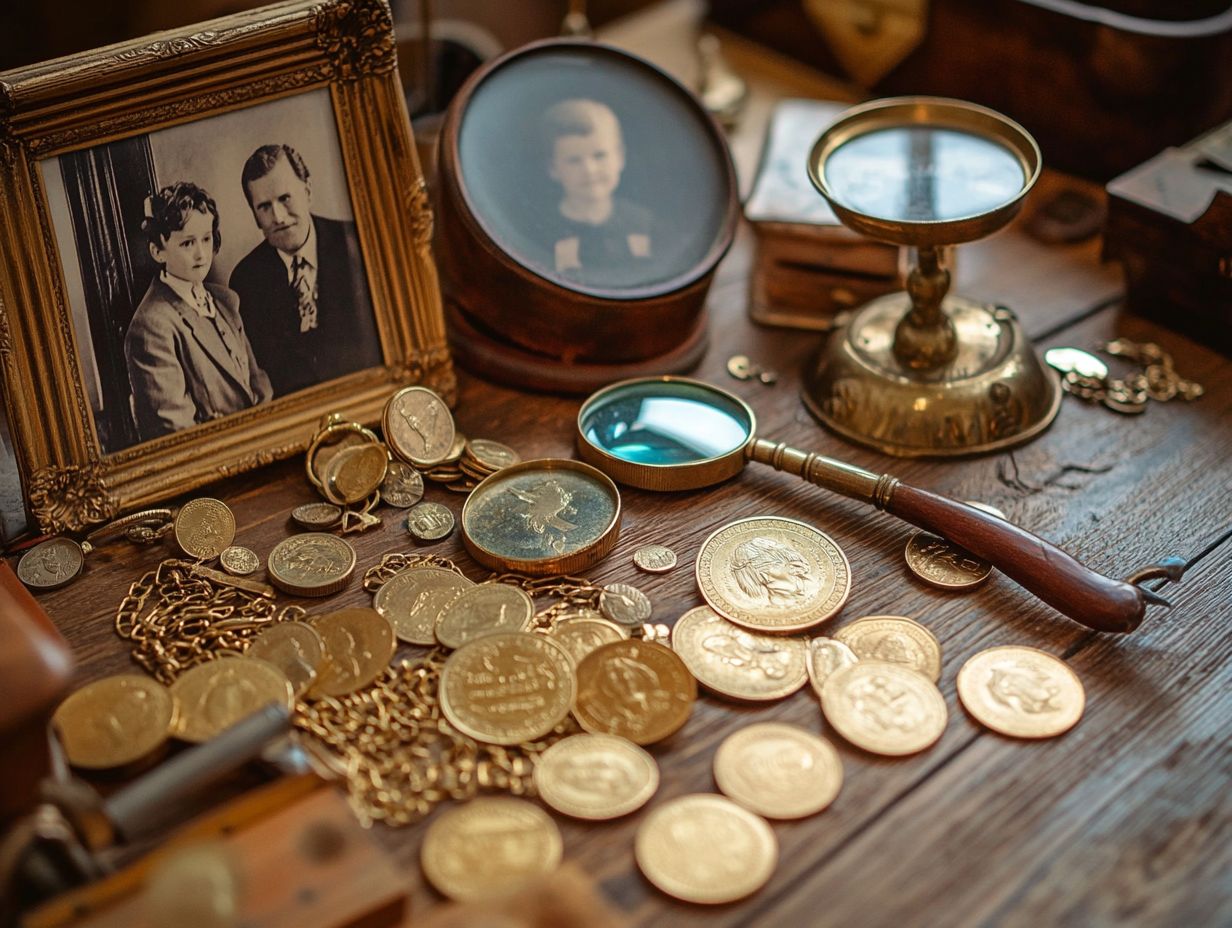
Deciding whether to keep, sell, or donate inherited precious metals requires careful consideration of your financial goals and weighing the options, such as cash offers from auction houses or pawn shops.
Every choice has emotional and financial impacts. If you decide to keep the metals, you’ll find satisfaction in preserving family history alongside the potential for appreciating value over time. On the flip side, selling them can provide immediate financial relief or even a substantial windfall, especially if the metals are in high demand. Understanding the role of precious metals in a portfolio can help inform your decision.
Auction houses can be an excellent platform for competitive bidding, possibly yielding a higher price thanks to market dynamics. Pawn shops, while convenient for quick cash, typically offer lower prices that might not reflect the true worth of your items.
By understanding these avenues, you can make informed decisions that align your financial planning with your personal sentiments toward your inherited treasures.
Factors to Consider Before Making a Decision
Before making a decision regarding inherited precious metals, it s essential to consider several key factors. Think about the tax implications involved, your emotional attachment to these items, and the potential estate and inheritance taxes that might arise when transferring ownership.
Each of these elements can significantly influence your choices and outcomes.
Tax Implications and Emotional Attachment
Tax implications play a vital role in your decision-making process regarding inherited precious metals. They are particularly influenced by the emotional attachment you may have to these items.
This emotional bond can sometimes cloud your judgment about your financial responsibilities. Understanding inheritance tax and estate tax is crucial, as these can significantly impact the net value of your inheritance.
Understanding the concept of step-up in basis is crucial, as it is a tax rule that can lower the taxes you pay if you sell inherited items in the future.
To navigate these complexities, it’s important to prioritize thorough tax reporting and maintain meticulous legal documentation. Doing so will ensure that all your tax obligations are managed properly, ultimately safeguarding both your financial and emotional interests.
Steps for Selling Inherited Precious Metals
Selling inherited precious metals requires a thoughtful approach. Begin by evaluating the items, carefully assessing their condition and authenticity.
Next, it s essential to determine their market value through a professional appraisal process, ensuring you have an accurate understanding of their worth.
Finally, finding reputable buyers is crucial, as this can greatly impact your selling experience and outcome. Engaging a financial advisor is also important, helping you navigate each step with confidence, especially when learning how to trade precious metals.
Evaluating and Finding Buyers
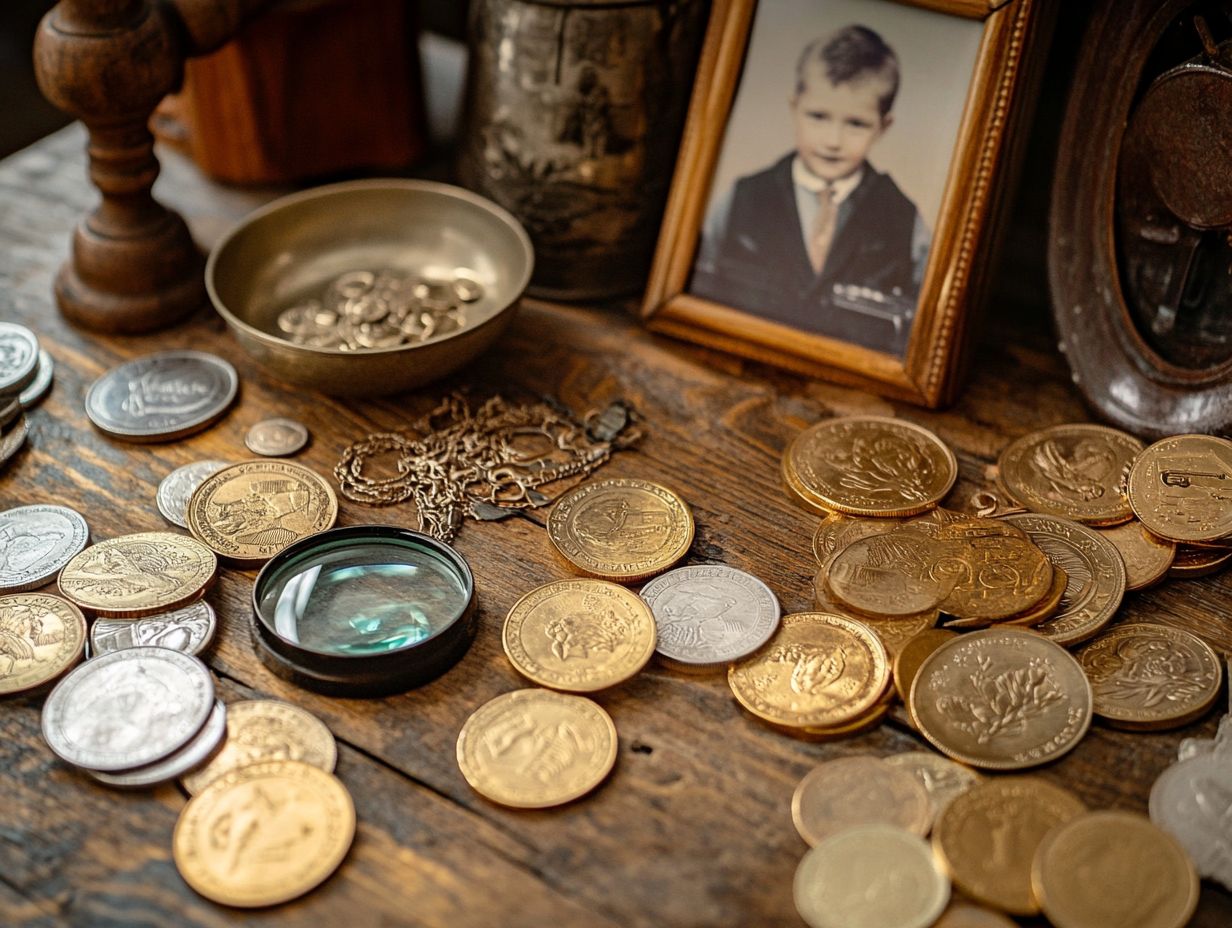
To effectively sell your inherited precious metals, the first step is to undergo a professional appraisal process to assess the items before identifying potential buyers, such as auction houses or coin dealers.
This evaluation requires a meticulous examination of the items’ quality, weight, and composition, enabling you to accurately determine their market value. A qualified appraiser employs specialized tools and industry expertise to produce a comprehensive report, which can significantly boost your selling price.
Once you’ve completed the appraisals, explore various avenues to find trustworthy buyers:
- Auction houses offer a competitive platform where your items can attract attention from collectors.
- Local coin dealers provide immediate cash bids along with a personalized selling experience.
- Engaging with online platforms focused on precious metal trading can also yield promising results.
Donating Inherited Precious Metals
Donating inherited precious metals to charitable organizations allows you to align your actions with your personal values while also unlocking potential tax benefits.
This approach serves as a strategic option within the broader context of estate planning and achieving your financial goals.
Charitable Organizations and Tax Benefits
When considering donations, choosing the right charitable organizations can significantly enhance your tax benefits. This decision serves as an effective strategy within your estate planning efforts.
Nonprofits vary widely, from local food banks to expansive global health initiatives, all of which may qualify for various tax deductions.
To ensure that your contributions provide you with tax advantages, confirm that the organizations are registered 501(c)(3) entities, indicating they are tax-exempt.
Act now to gather essential documentation, such as receipts and acknowledgment letters, which will serve as proof of your donations for tax purposes.
Consulting a financial advisor is advisable to navigate the complexities of estate planning, as well as to understand how charitable contributions can influence your overall tax liabilities.
By strategically planning these donations, you not only contribute to the community but also cultivate personal financial benefits.
Frequently Asked Questions
What to Do with Inherited Precious Metals?
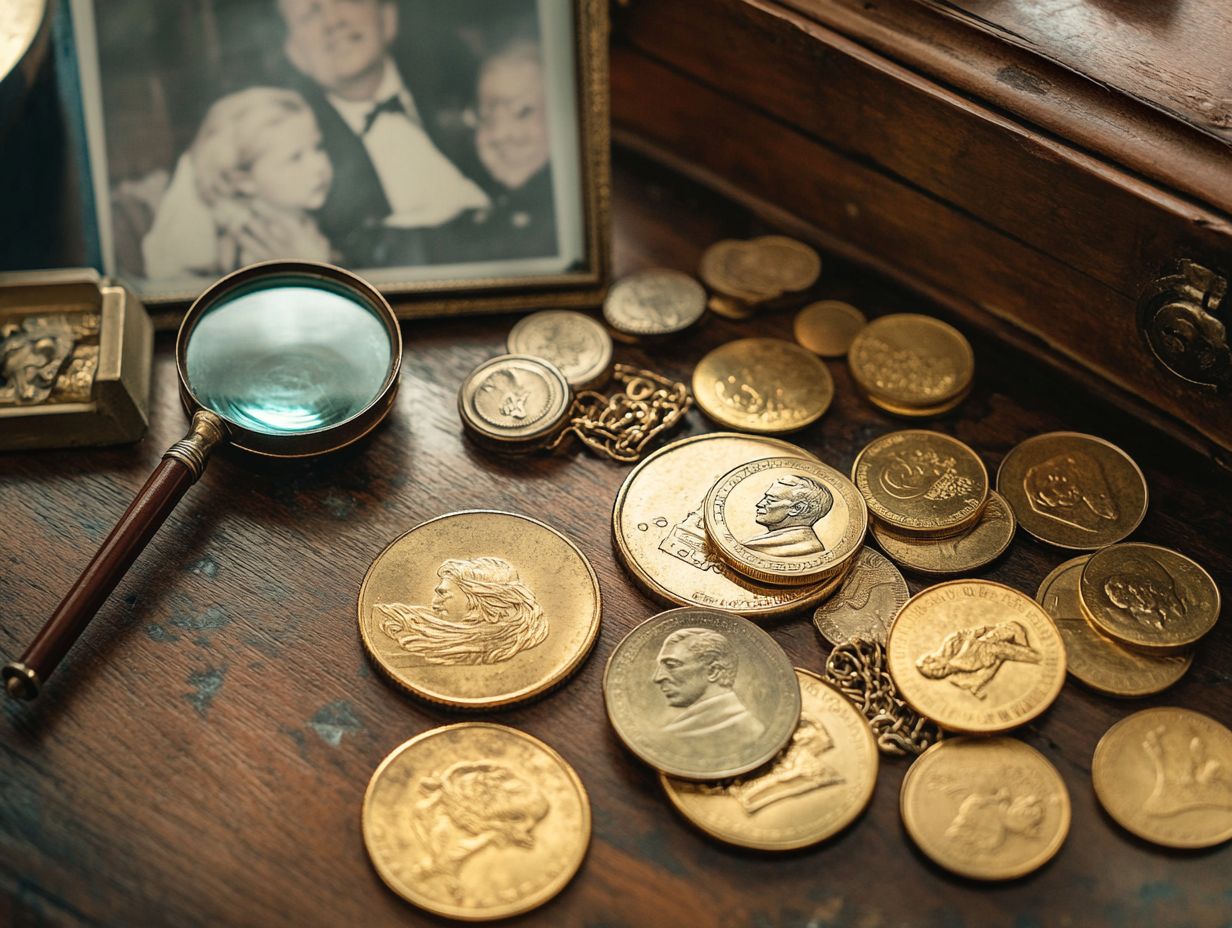
You have exciting options for your inherited metals! What you choose depends on your personal preferences and financial goals.
Can I Sell Inherited Precious Metals?
Yes, you can sell inherited precious metals. Research the current market value and be aware of potential taxes before selling.
What Are Some Alternatives to Selling Inherited Precious Metals?
Instead of selling, consider keeping them as an investment. You could also gift them or use them to create jewelry.
Do I Need to Pay Taxes on Inherited Precious Metals?
Usually, you won t pay taxes on inherited metals. However, if you sell them for a profit, you may owe capital gains taxes.
Should I Get My Inherited Precious Metals Appraised?
Getting an appraisal is a smart move, especially if you plan to sell or make jewelry. This helps you understand their true value.
What Are Some Tips for Storing Inherited Precious Metals?
Store your precious metals in a safe place, like a safe or safety deposit box. Keeping them in original packaging or using proper storage materials prevents damage.










